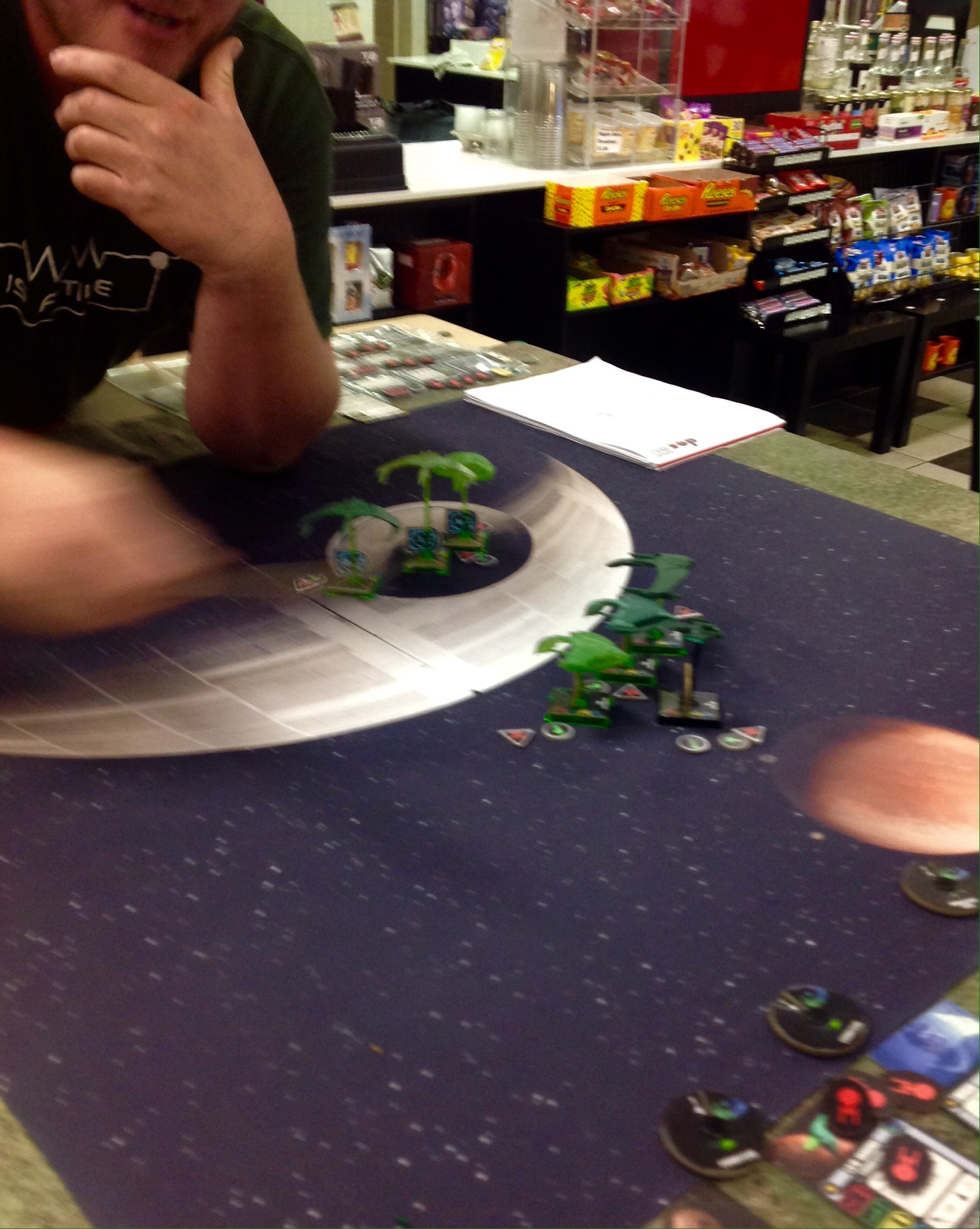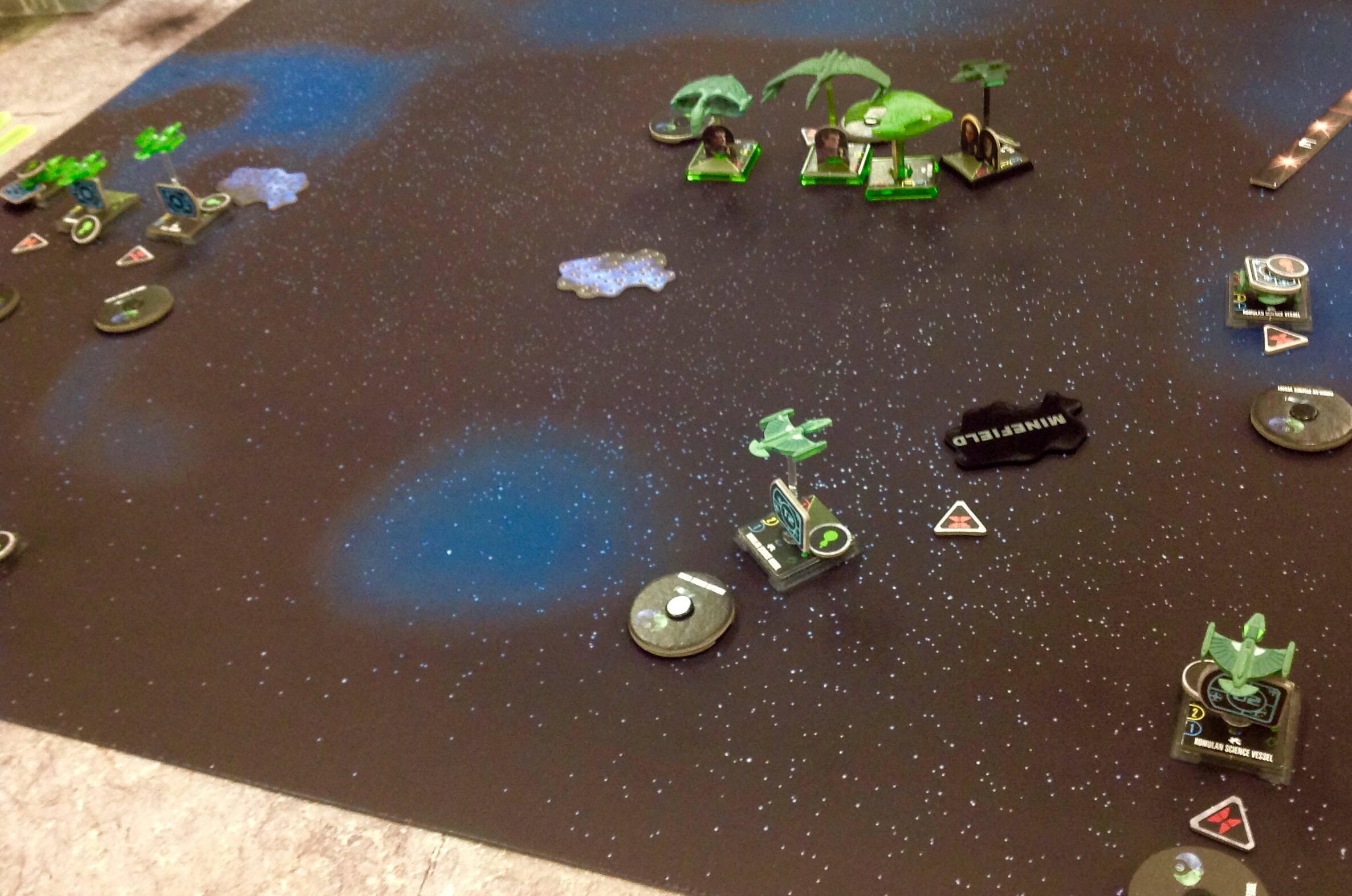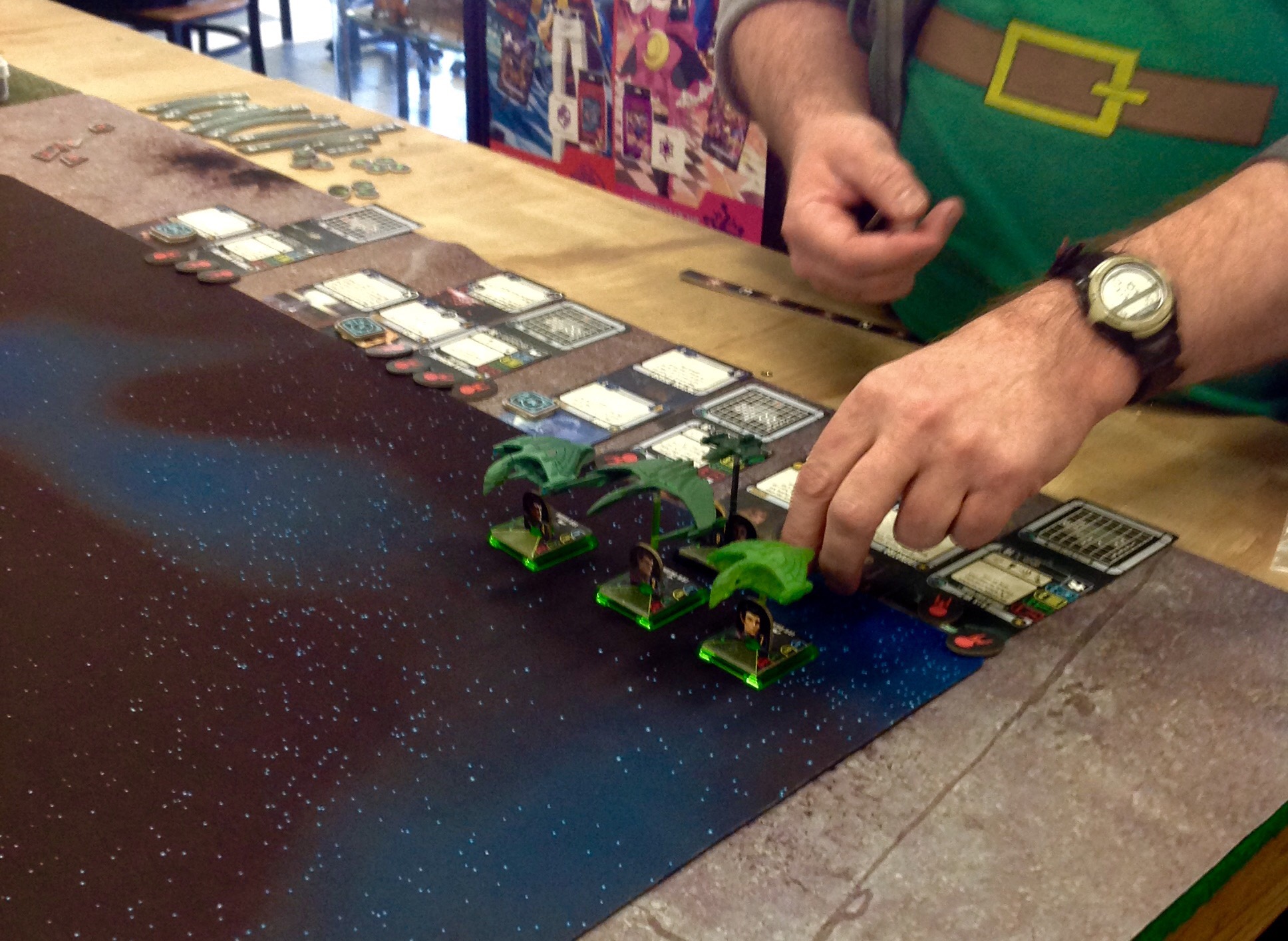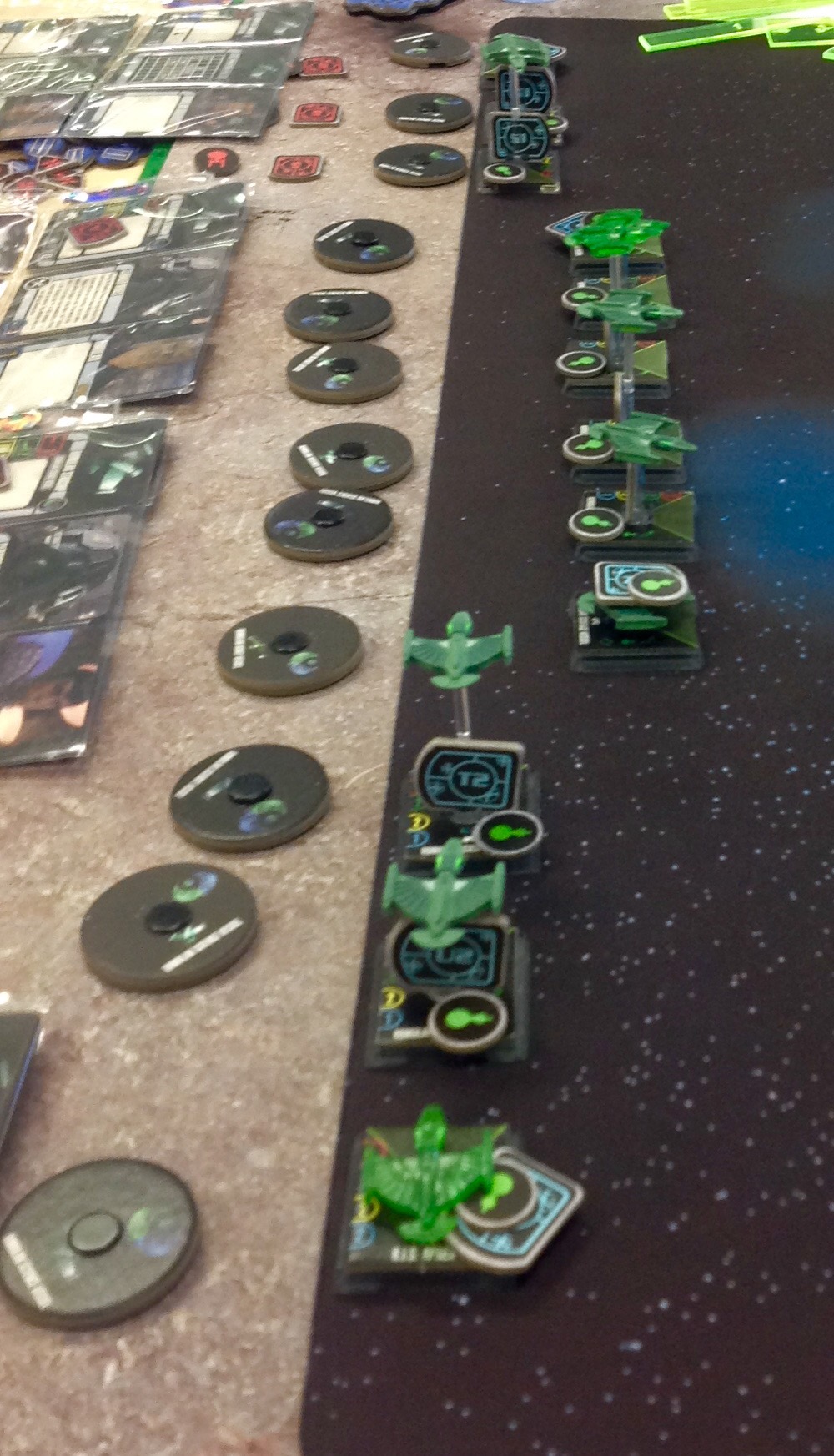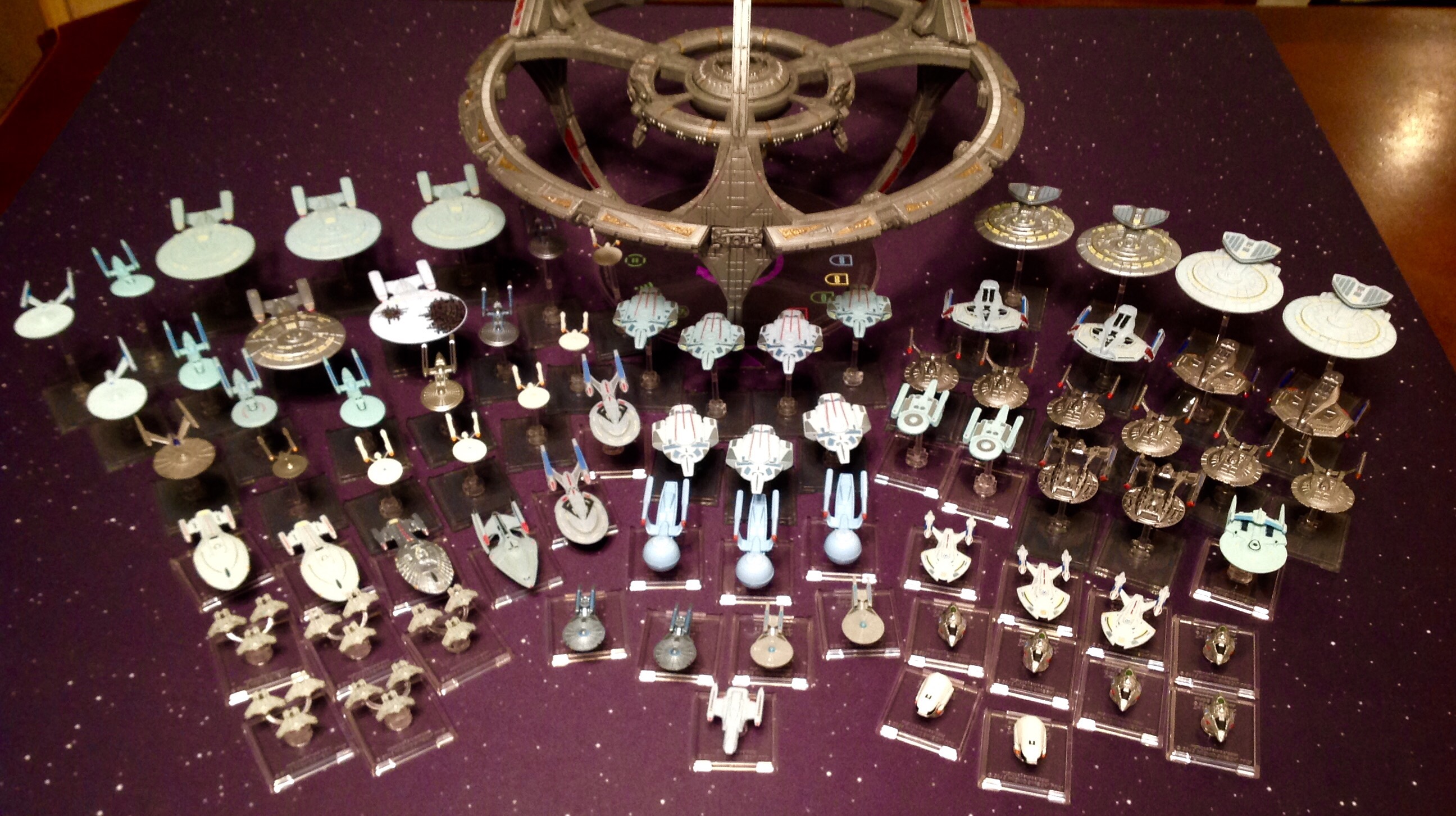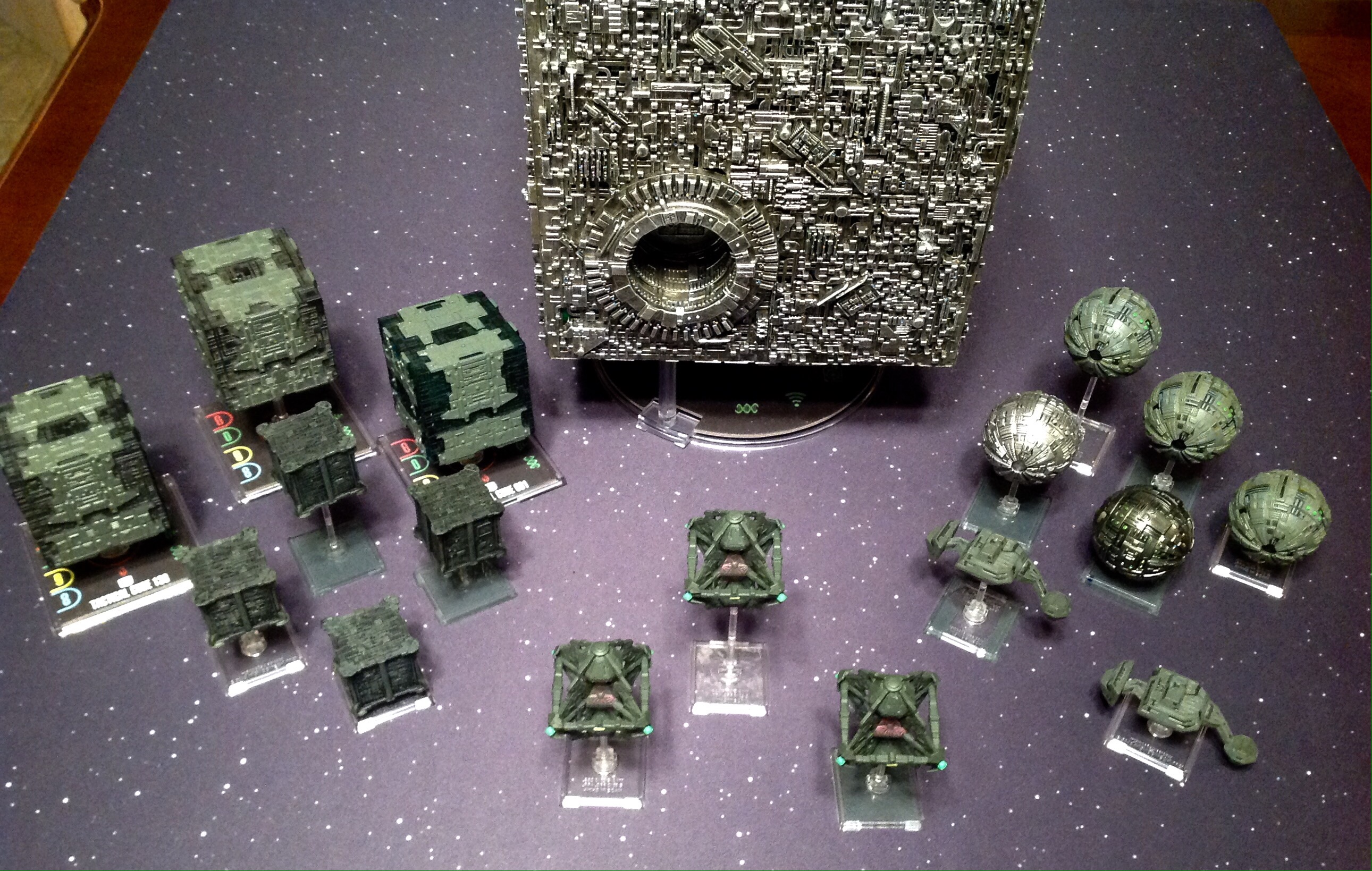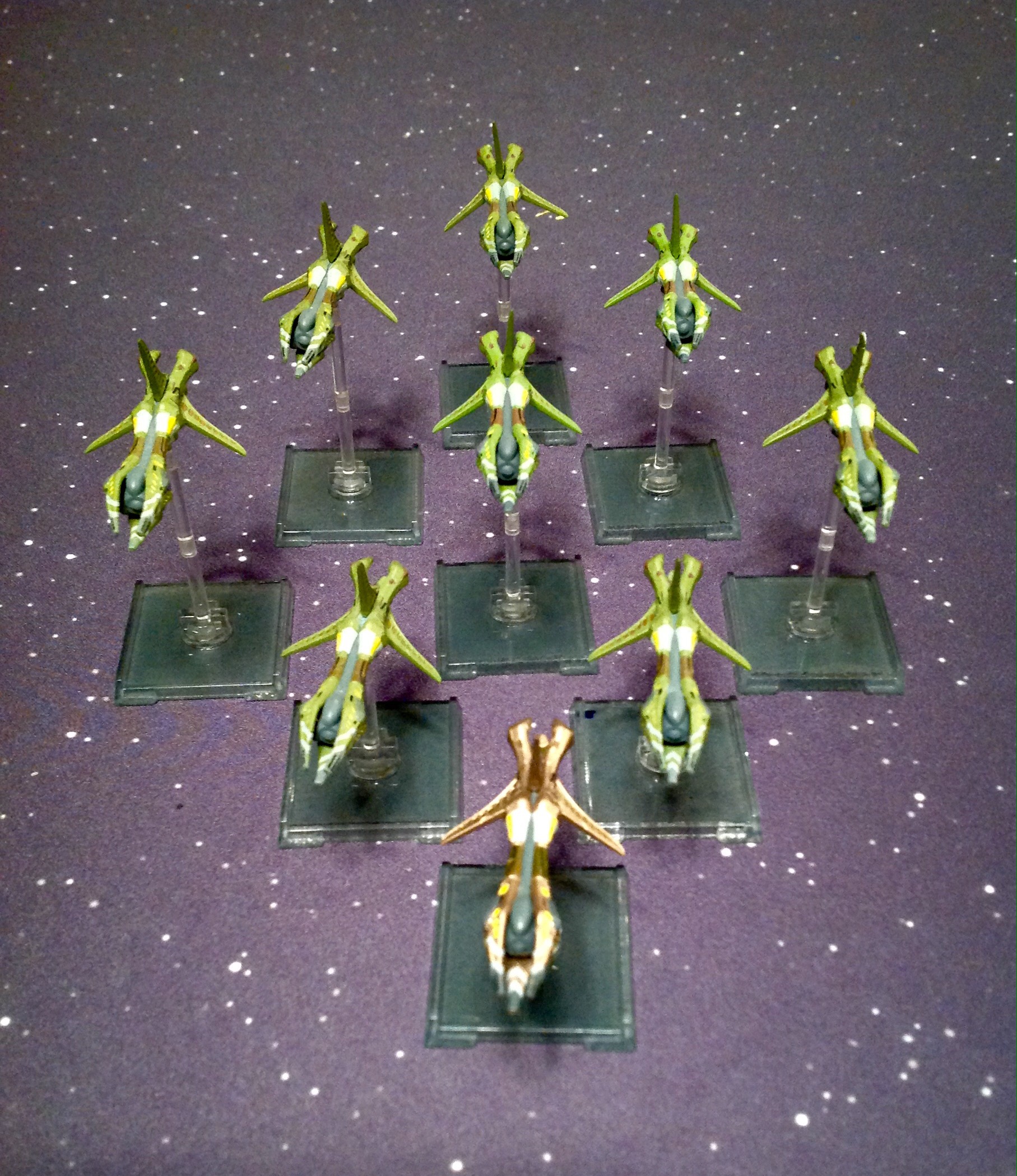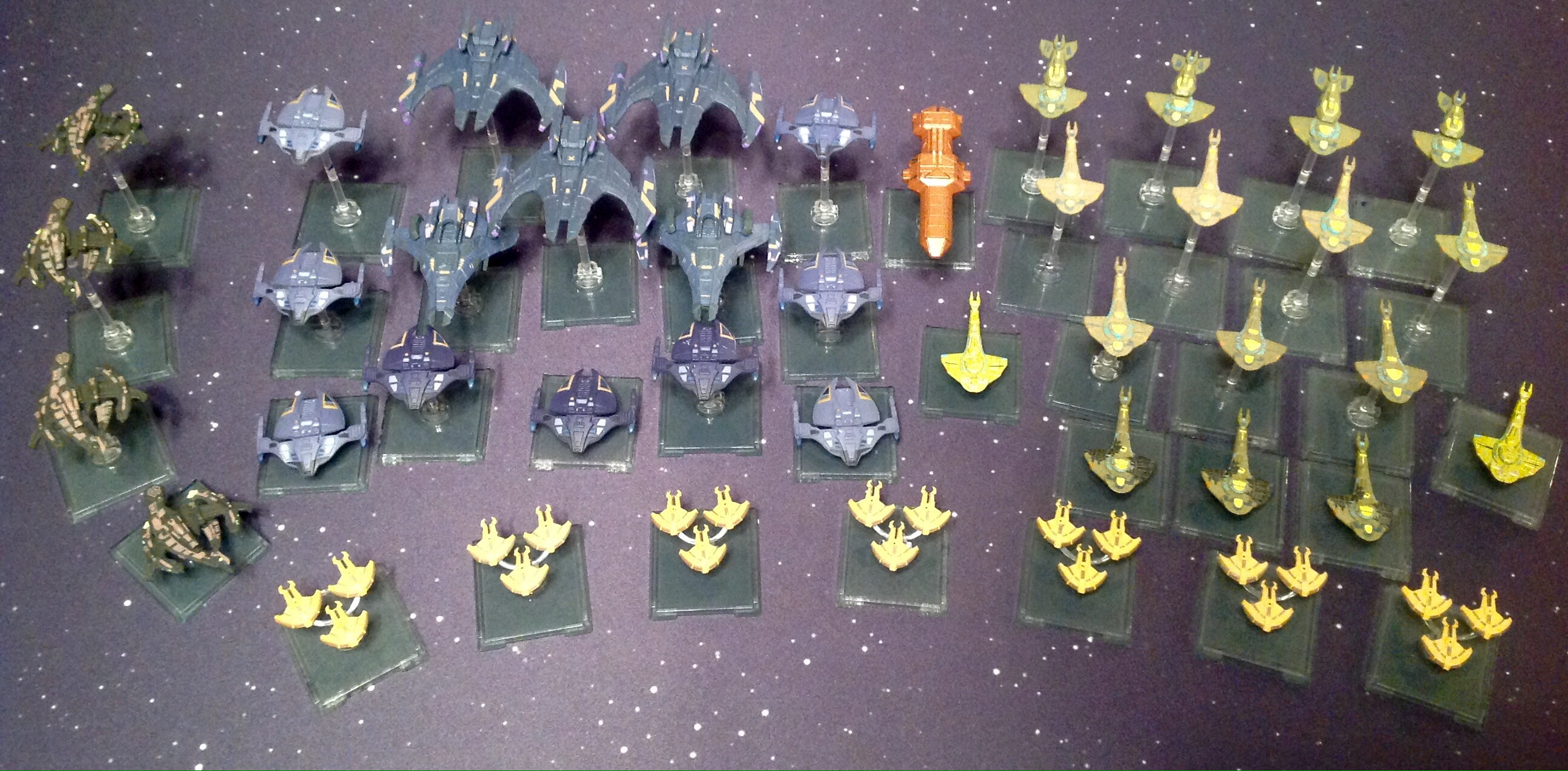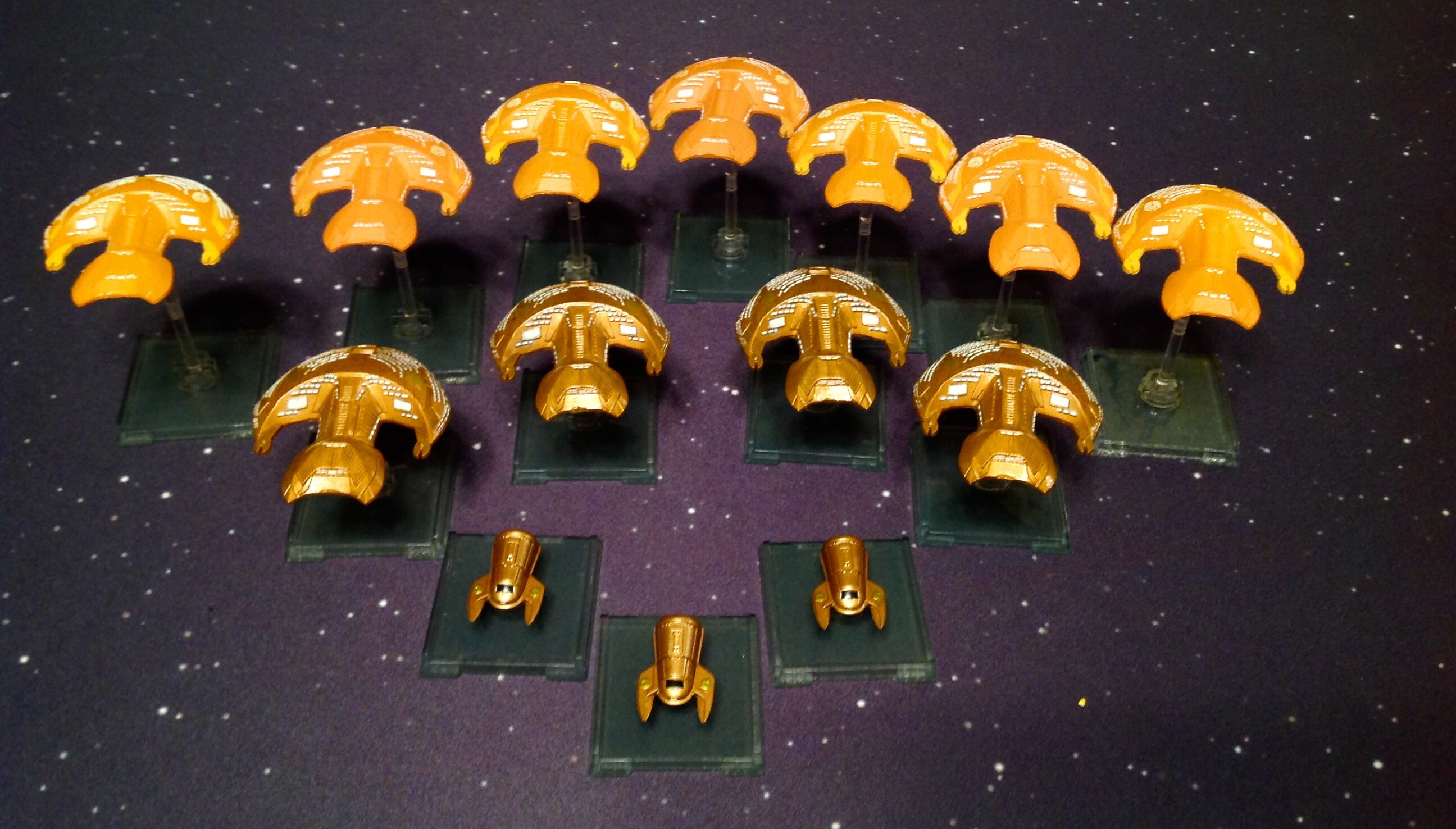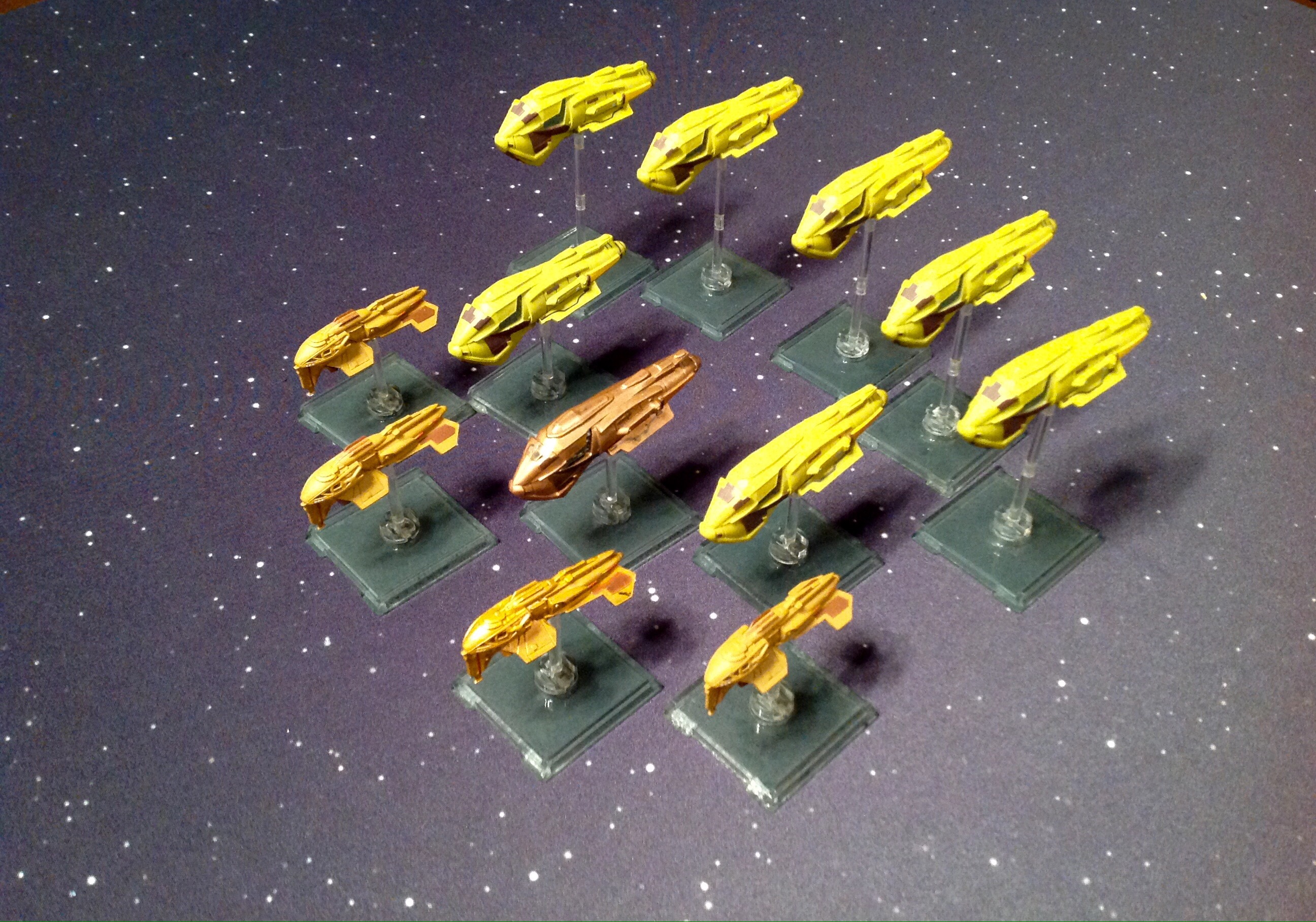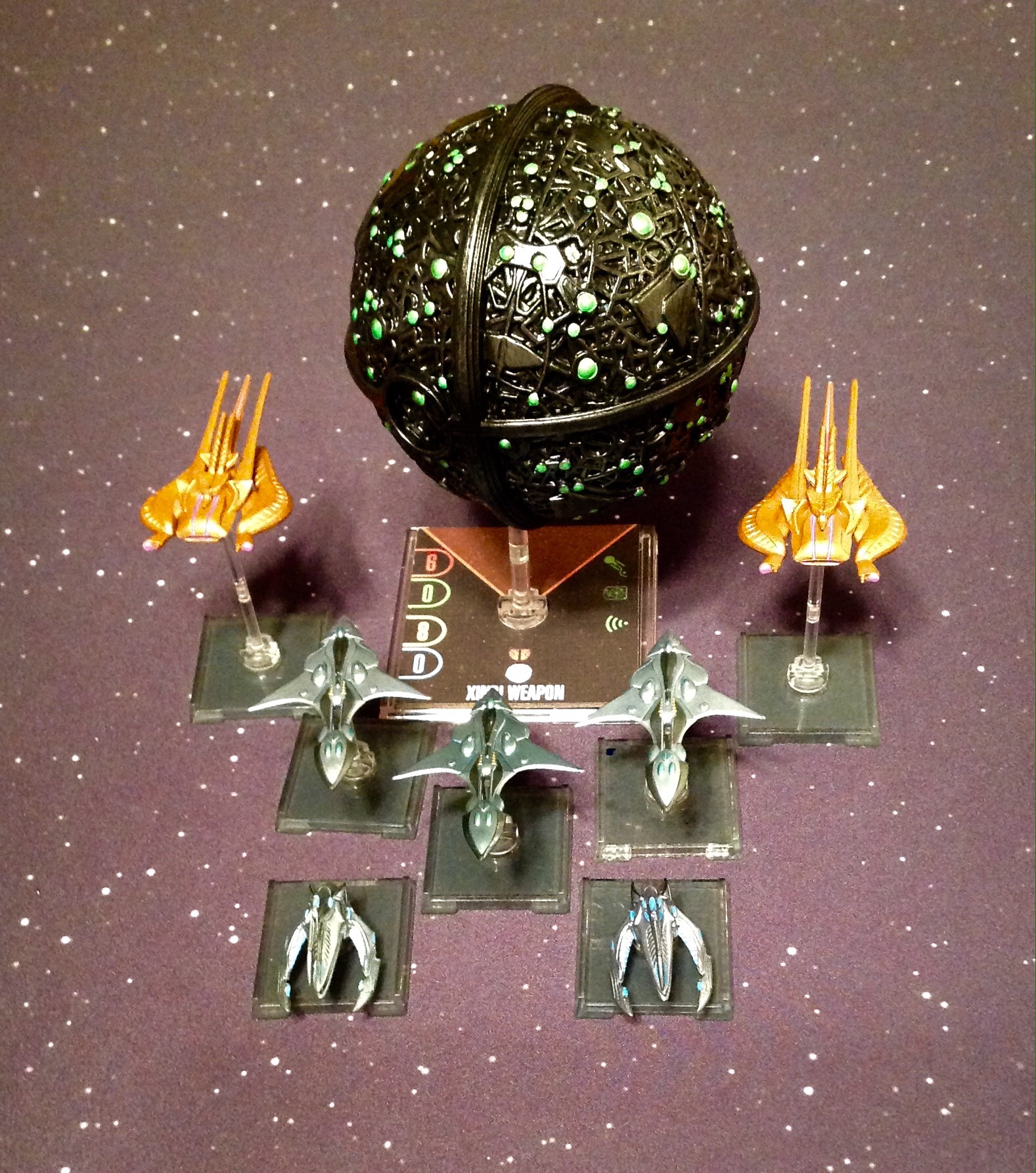Three months. For three months, I’d been planning it. And no matter how I looked at it, I couldn’t see a way to lose. No matter what the other guy tried, I was going to win. I replayed the scenario over and over in my mind, looking for any flaw in my strategy. I was going to win. It was going to be great.
I was right and very, very wrong.
I’ve recently started playing a game called Star Trek Attack Wing. The game is fun, especially if you’re a fan of the Star Trek series and movies. The game is simple, and very complex. You pick a ship, or serveral ships. You pick a captain, crew members, weapons and any tech upgrades. Then, you put your fleet against your opponent’s fleet in a 36″ x 36″ play area. Of course, there are attack dice that cause damage to your opponent, defense dice that help keep you from taking damage, movement options and several Star Trek specific features, like cloaking or “warp drive.”
The scenario we played on Saturday was simple. It was based on the Klingon Civil War, a series of episodes from Star Trek: The Next Generation television series. However, I noticed something about the rules. In a tournament, (also called an OP for Organized Play) the victory conditions involved not only defeating the enemy ships, but also accomplishing specific mission objectives. One of these was to have one of your ships make a particular movement called a “banked sensor echo.” You got 5 victory points each time one of your ships performed this move.
A typical “fleet” included 3 ships, each valued at about 40 points. Given that a typical game goes four or five turns, the victory points for the sensor echo were not nearly as important as trying to kill one of the opponent’s 45 point ships.
Except, there was a flaw in the scoring. Researching strategies from those how had already played the OP, they pointed out that instead of 3 ships costing about 40 points each, you could choose to field 12 ships costing 10 points each. Now, these little ships were not very strong. There was no way they would be able to kill a 40 point ship. But, they didn’t have to. All they had to do was sensor echo each turn and they’d rack up points. After the first turn, you’d earn 60 victory points from sensor echoing. After two turns, you’re at 120, the value of the opponent’s entire fleet. After the third turn, there is literally no way that you could lose. Even if your opponent kills a few of your ships, the remaining ones will continue to score points until the one hour time limit is reached.
It wasn’t a completely painless strategy. Each ship, cost $15 retail. Even finding some on sale, it wasn’t cheap to buy a bunch of these weak ships. But, there were prizes awarded for winning the OP. And technically the rules allowed this setup.
I couldn’t lose.
But, I did. Oh, not the battles. They went exactly as I had practiced. The first game, I lost three of my twelve ships, but I completed 44 sensor echoes.
Game 1 Final Score:
Him: 33 points
Me: 220 points
Not even close. I win! And that’s when I realized the real flaw in my plan. The person I was playing was good player. He enjoyed multiple types of games only one of which was Star Trek. He played a competent game and aside from some very unlucky dice rolls, played well. But, he didn’t have any fun. He knew the result before we started. He only agreed to play because it was a tournament.
The second game was between the other two players at the OP. The one I’d played first had a 4 ship fleet, with a very weak ship acting as his flag ship. The second player had three strong ships. The battle was back and forth for the first 45 minutes, but the tide turned in the last quarter hour and one person came off victorious. It was a hard fought battle and both players had a lot of fun. Even I had fun and I was just watching.
The third game of the night was me against the loser from the second game. He’d seen the first game and had some ideas on strategy. We were pretty quick between turns and managed to get eight turns completed within the hour. He killed three of my ships. I never took even a single shot at his ships.
Game 2 Final Score:
Him: 34 points
Me: 350 points
I had come to the tournament with a specific strategy and it had paid off brilliantly. And I have rarely been so embarrased in my life. I found myself apologizing to my two opponents. The three of us played for three hours, one hour of which was enjoyable and two hours of which were pretty boring and not fun.
Yes, I knew I was going to win. I spent a not insignificant amount of money buying special ships to ensure I won. I came with a plan and it worked beautifully. I won not only the prize ship for the night, but the grand prize for the entire 3-month campaign.
And I went home the biggest loser. The point of the game was not to win the prize ships. The point of the game was to enjoy each others company and to play your fleet against the other guy’s fleet. But, I completely missed the fact that “playing” and “winning” were not the same thing.
To Aaron and Will, I apologize. I’ll try not to lose so badly in the future.
The best game of the night played out on a Star Wars game mat.
My strategy of “Run but don’t fight” was more accurately described as “You can’t win.”
What a typical fleet looks like.
Rodney M Bliss is an author, columnist and IT Consultant. His blog updates every weekday. He lives in Pleasant Grove, UT with his lovely wife, thirteen children and grandchildren.
Follow him on
Twitter (@rodneymbliss)
Facebook (www.facebook.com/rbliss)
LinkedIn (www.LinkedIn.com/in/rbliss)
or email him at rbliss at msn dot com(c) 2017 Rodney M Bliss, all rights reserved
Two billion dollars. That’s the amount that will be spent on candy for this weekend. That’s just a part of the estimated $18,000,000,000 that will be spent by United States consumers for this weekend.
So, what’s the occasion?
It depends on whom you ask. There are at least four celebrations that happen this week.
Jewish Passover
The first holiday happened a couple of days ago. April 11th was the date of the Jewish celebration of Passover. It was also the night of the full moon. That was not a coincidence. The Jewish calendar is based on twelve lunar months of 29 or 30 days each. The new moon marks the beginning of each month and Passover is celebrated on the 14th day of Nisan, the 7th month in the year. If you start your month on the new moon, the full moon is going to occur 14 days later. Passover is always the night of the full moon.
Chag Kasher V’Sameach to my Jewish friends.
Pagan Ostara
March 20th is the date of the Spring or Vernal Equinox this year. The Vernal Equinox is when the sun crosses over the plane of the equator. It’s the day on which the amount of daylight and the amount of darkness are roughly equal. In the Norther Hemisphere the “days” now get longer.
Pagans typically celebrate the Ostara in connection with the Vernal Equinox. The celebration recognizes the arrival of spring. It’s true that this holiday was last month, but its ties to the Christian celebration of Easter are pretty close, so I’ve included it here.
Christian Easter
I love calendars, dates and time keeping. Easter is one of the few calendar events that cannot be computed with just a calendar. Most holidays are calendar-based. Thanksgiving is the third Thursday in November. Christmas is the 25th of December. But, Easter, is the first Sunday after the first fullmoon after the Vernal Equinox. Its name comes from the Pagan Sumerian goddess Ishtar.
Christians celebrate this as the day that Jesus Christ was resurrected from the dead. Along with Christmas, it’s one of the most revered day in Christianity. It also happens this coming Sunday, April 16.
The Other One
So, that’s three. What’s the fourth holiday? I’m not sure what to call it. Most people call it Easter. But, it borrow from the Pagan traditions more than Christianity. Easter morning, millions of kids will wake up to Easter baskets. Baskets full of fake plastic grass, eggs, bunnies, chocolate and lots and lots of candy.
Eggs and rabbits were the two symbols of Eostre, the Lunar goddess of fertility. I’m not sure that sugar has its origins in anything other than candy companies, but the egg and rabbit symbol are ancient.
Whether you are Jewish, Pagan, Christian or just a lover of all things confectionary, here’s hoping you have a wonderful holiday.
Rodney M Bliss is an author, columnist and IT Consultant. His blog updates every weekday. He lives in Pleasant Grove, UT with his lovely wife, thirteen children and grandchildren.
Follow him on
Twitter (@rodneymbliss)
Facebook (www.facebook.com/rbliss)
LinkedIn (www.LinkedIn.com/in/rbliss)
or email him at rbliss at msn dot com(c) 2017 Rodney M Bliss, all rights reserved
Where’s the rest of my money?
What do you mean?
It says here I’m getting $9,000. I think that should be more like $18,000.
I was speaking to my brother. And the money wasn’t actually coming from him. He’s my accountant and we were discussing my taxes. My brother owns a CPA firm “Bliss & Skeen CPA.” The “Bliss” portion was my mother, who founded the firm. She’s been retired for years. My brother is the “Skeen” portion.
Mixing family and money is a often a volatile combination. When my mother ran the firm, it sometimes led to awkward conversations.
Well, I don’t really understand why you don’t have more money in the bank, given what you make.
After my brother took over, it improved my relationship with Mom and never became an issue with my brother.
Honestly, Rodney? They’re just numbers. I don’t even really pay attention to the amounts. I’m just interested in making sure we’ve claimed all the correct deductions and credits.
There are some benefits to having a brother who is a CPA. First, of course, is that I don’t have to do my taxes. I get the data to him and he fills out all the paperwork. My taxes have been complicated at times. I’ve had LLCs in my name, and I’ve written books with advances and royalty payments. I’ve been a 1099 employee keeping track of all of my own deductions. It’s not unusual for my tax forms to be literally a book that is 30-40 pages long.
But, the second, and better benefit is that I haven’t paid taxes in the past 20 years. Oh, I file my taxes every year. Or, rather, my brother’s firm files them electronically for me. But, when you look at the numbers at the bottom of the page, it never says, “You paid the government this much money.”
There are lots of reasons. I have a large family, so the child tax credit helps. I donate a lot of money to my church and other charities. I have a mortgage. And I have a really good accountant.
This year, I was surprised though. We bought solar panels last year. We rolled the $35,000 expense into a home refinance. But, we get a bunch of that back on our taxes. It should be close to a third. And it was that money that I didn’t see in my tax refund. My brother explained.
Yeah, so the solar panels qualify for a non-refundable tax credit. And it wasn’t $9,000. It was more like $11,700. But, the thing about a non-refundable tax credit is that it can only be applied to the tax you owe. After all the other deductions your tax liability came to $756. So, we applied the solar panel credit to that. The rest of it rolls forward to next year.
You’re telling me that at the current rate, I have enough tax credits for the next 10 years?
Pretty much.
It doesn’t even help if I cut back on my charitable giving, or other deductions. Neither would change my tax liability and so wouldn’t affect the amount of a refund. Of course, in the next 10 years my kids will be leaving home and I’ll lose those deductions. And at some point, I’ll retire (although not within ten years.) But, in the mean time That $10,000 stays with the government.
The only way I could get a bigger refund check is if the government were to increase my tax rate. Think about that for a minute. If the government raised my taxes, I’d get a bigger refund check next year. Like I said, it’s great to have a brother who is a CPA.
I haven’t paid taxes in the last 20 years and it appears I won’t be paying taxes for the next decade or so.
But, meanwhile the government gets to keep my money.
Rodney M Bliss is an author, columnist and IT Consultant. His blog updates every weekday. He lives in Pleasant Grove, UT with his lovely wife, thirteen children and grandchildren.
Follow him on
Twitter (@rodneymbliss)
Facebook (www.facebook.com/rbliss)
LinkedIn (www.LinkedIn.com/in/rbliss)
or email him at rbliss at msn dot com(c) 2017 Rodney M Bliss, all rights reserved
You cant swim with me
I was new on the Timberline high school swim team. And had only been to a few practices. As you can imagine, you do lots of swimming at swim practice. The pool was 25 meters long, divided into multiple swim lanes. The slowest swimmers swam in the lanes to the far right. The fastest swimmers to the far left. And each swimmer was expected to pick his own lane.
Rather than stick to the far right lane, where my skills dictated I should be, I moved several lanes to the left and found myself in the same lane as Jeff. Jeff wasn’t being mean. He was being honest. As a junior and more importantly a long time swim team members, he swam much faster than I did. I literally would not be able to keep up with him. And he didn’t want me in his lane.
You might be tempted to think it was a sense of superiority that prompted his comment. It wasn’t. It was practical. We were going to swim at least a dozen laps or more during the warm up. If I insisted on swimming in Jeff’s lane, he was going to quickly outdistance me, probably before we hit the first turn. The lanes were big enough for swimmers to go both ways. Like cars, we stayed to the right. There were still occasional collisions, but mostly in the lanes to the far right.
Jeff knew that within a couple hundred yards he was going to not only have distanced himself, he was going to have literally “lapped” me. He’d be swimming up behind me and have to either slow down or attempt a difficult passing maneuver. Neither of which appealed to him.
As I made my way back to the lanes on the far right-hand side of the pool, I thought about the idea that we choose to be where we are comfortable. Swimming with the other first year swimmers, we would all go about the same speed. No one would need to worry about passing or being held back. In fact, that was how you knew that you were ready to move a lane to the left. If you consistently were out-swimming the people in your lane, you moved up a lane. If you were injured or simply needed to back off your pace, you moved down a lane.
In the Mormon theology, it’s believed that in the afterlife, people will pick their own version of paradise. It’s a unique concept that on the surface seems crazy. I mean, if you get to pick your eternal reward, why wouldn’t you pick the very top?
If you get to write your own check. . .write a big check
But, actually, we incorporate that concept into our daily lives.
I don’t want to sit too close to the front of the theater, it gives me a headache
I want concert tickets as close to the stage as possible, I love the noise
I’m not comfortable driving more than a couple of miles per hour over the speed limit, I’m going to stick to the middle lanes
Every day, we self-select the people we choose to be around, the neighborhoods we choose to live in, the people we choose to go to lunch with. We are constantly “picking our own poison.”
When we don’t end up in a spot we are comfortable with, we either move or we adapt. If you cannot stand working for your boss, you go look for another job. If you hate the snow, you move to a warmer climate. Of course, families complicate that picture quite a bit. As a child, actually a young adult, I couldn’t wait to escape my parents’ house. I didn’t like their rules. I didn’t like them telling me what to do. I didn’t like the restrictions. And while I understood that there were some benefits, they weren’t worth the cost. I moved.
But, I also adapted. As I had to pay for my own expenses I started to appreciate the things I’d taken for granted at home. As I started having my own kids, I started to understand the reasons for the rules and oversight. Eventually, I realized I was not that different than my own parents. In fact, we ended up in the same swim lane. I discovered that I like them and we shared similar values and priorities. Having the freedom to choose whom I would associate with, I chose them.
We don’t get to choose every aspect of our life and surroundings. And often there are things we’d dearly love to change or move from and we simply can’t. But, the more I thought about the concept, the more convinced I became that we really do get to pick the life we choose.
As for the theological question of what happens after we die? I’ll have to get back to you later on that one. Hopefully much later.
Rodney M Bliss is an author, columnist and IT Consultant. His blog updates every weekday. He lives in Pleasant Grove, UT with his lovely wife, thirteen children and grandchildren.
Follow him on
Twitter (@rodneymbliss)
Facebook (www.facebook.com/rbliss)
LinkedIn (www.LinkedIn.com/in/rbliss)
or email him at rbliss at msn dot com(c) 2017 Rodney M Bliss, all rights reserved
If you want something done, ask a busy person.
Do you know why they say that? Sure, part of it is the fact that those busy people are motivated. If they are motivated to do other stuff, they’ll probably be motivated to do your stuff.
Part of it is probably that those people are good at getting stuff done. In baseball, there’s a pitcher whose role is called “the closer.” His job is to come in during the 9th inning and get the final three outs. In sales, the “closers” are the guys who get the client to commit and actually get the sale. It’s a skill. Busy people often have it.
But, I think the real reason that a busy person is more likely to get done whatever you are asking them for is that nothing succeeds like success.
Baseball season just started. Already my beloved Seattle Mariners are mired in last place in their division. But, the season is early and they are only three and a half games back of the first place team. At some point the M’s are going to have a winning streak. They won yesterday for their second win of the young season, so maybe that will be the start. But, a winning streak takes on a life of its own. The team starts to believe in themselves. They start to believe they can’t lose. And that confidence helps them perform better. They start to succeed because they are succeeding.
Most of us will never play center field for the Mariners (or any other team except maybe our company softball team.) But, we each have “games” we are trying to win. We have stresses. We have doubts. (Yes, everyone has them, don’t let anyone tell you differently. They are lying.) And as we meet each challenge, as we “win” each game, just like major league ballplayers, we start to gain confidence. We begin to trust ourselves. We start to feel we can’t lose. And that confidence helps us accomplish the next task, and the next, and the one after that. Soon, we are plowing through our TODO list like a baserunner running through the stop sign at third. We know it’s going to work.
So what if you aren’t that guy or woman? What if you are in a slump? What can you do about it? Fortunately, none of us have to face a 95 MPH fastball to try to get out of our hitting slump. You look for the easy wins. You look for the low hanging fruit. You start to chaulk up some wins. And as surely as a Wednesday get-away day follows a three game homestand, we will start to see success. We can’t help but start to become more successful.
And unlike the 30 teams in MLB, we are not competing with our coworkers for wins. We can all win. And as you start to get those wins, others will start looking to you to be the goto person. They will bring projects to you not because you are busy, but because you are successful.
It’s the start of a whole new season. Start your own winning streak.
(And go M’s!)
Rodney M Bliss is an author, columnist and IT Consultant. His blog updates every weekday. He lives in Pleasant Grove, UT with his lovely wife, thirteen children and grandchildren.
Follow him on
Twitter (@rodneymbliss)
Facebook (www.facebook.com/rbliss)
LinkedIn (www.LinkedIn.com/in/rbliss)
or email him at rbliss at msn dot com(c) 2017 Rodney M Bliss, all rights reserved
Rodney, can I see you in my office?
It’s a common phrase. If you replace that first word with your name, it’s probably something you hear on a fairly regular basis and think nothing of it.
I hate it.
Unfortunately, early in my career, I had some really bad managers who used that phrase as the opening line of a “beat up on your employee” session. In hindsight, I know that they were terrible at the “managing” part of their jobs. At the time, I just thought it was what managers had to do. As a result, I avoided going into management. If you had to be a jerk at times, I wanted no part of it.
I watched a brief episode one time of “Undercover Boss.” The premise was that they’d take the CEO of a large company and put them in as a frontline worker. This particular episode was a fast food restaurant that was part of a larger chain. The “boss” became a new front counter person. The restaurant manager was horrible. He belittled his employees. He yelled. He made them fear for their jobs. When the undercover CEO tried to offer suggestions on his management style, he only succeeded in drawing the ire onto himself.
Finally, in the culminating scene, the CEO had seen enough. He was supposed to stay under cover, but couldn’t see his employees being abused any longer so he confronted the manager.
Oh? Do YOU have any experience in the fast food industry?
Actually, I do. Quite a bit, actually. In fact, I’m the CEO of THIS restaurant chain.
The look on the manager’s face was pure TV gold. YES! The CEO was going to do what every beatdown employee has wanted to do, he was going to tell off the manager and make him take it!
But, a funny thing happened. The CEO, as he took off his apron didn’t yell. He didn’t belittle. He put his arm around the shoulder of the manager and walked off camera giving him advice. Then, he announced that the restaurant was going to shut down for two weeks. During those two weeks, all employees were going to be paid and they were going to go through training again. And this plan INCLUDED the former manager.
The CEO resisted the urge to give the manager a verbal thrashing. He understood that it wouldn’t accomplish anything. He also understood that it was best for the company if the manager could be saved. And, most importantly, the CEO took ownership of the problem. He viewed it as a personal failure of his own leadershp that this manager was managing the way he was.
The CEO could have chosen to manage through fear. He could have fired the overbearing manager and cussed him out on his way out the door. Instead, he chose to manage through faith: faith in his employees, faith in his company processes, faith in his own ability to coach people.
Eventually, I was forced into a management role. I was working for a small startup staffed by a bunch of new college grads and they designated me the “grown up.” I realized that you don’t have to be a jerk if you are the boss. People make mistakes. I make mistakes. Mistakes are a part of life and certainly a part of business. You need to trust people. If you cannot trust your employees, you should either fire the employees, or find a new position yourself. You cannot be an effective manager if you feel the need to manage through fear.
Trust your people and they in turn will trust you.
You can see pics of Undercover Boss episode here
Rodney M Bliss is an author, columnist and IT Consultant. His blog updates every weekday. He lives in Pleasant Grove, UT with his lovely wife, thirteen children and grandchildren.
Follow him on
Twitter (@rodneymbliss)
Facebook (www.facebook.com/rbliss)
LinkedIn (www.LinkedIn.com/in/rbliss)
or email him at rbliss at msn dot com(c) 2017 Rodney M Bliss, all rights reserved
This was going to be an inspirational post. I had this great idea of talking about managing through faith in your employees rather than fear of them. It was going to be brilliant. Really, some of the best stuff I’ve ever written.
This isn’t that post. This is the “life” post that John Lennon claims happened while I was making other plans. It’s Spring Break for the schools here in Utah. My lovely wife took our kids down to Souther Utah to Zions National Park and St George. I didn’t feel I could take the entire week off, but decided, I’d head down on Thursday night and we’d do some stuff with my family on Friday and come home Friday evening.
Yeah, that plan was a nice plan. It’s still a nice plan I have a record of it right there in my calendar. That’s as far as it got. Our client was onsite on Thursday and what was going to be an hour or two for me to be involved turned into about 5 hours of really good, important meetings.
Yeah, sorry I’m going to have to work late to complete the stuff I ended up putting off to meet with the client. Maybe I can come down in the morning.
With no one at home waiting on me, I ended up staying at work until nearly midnight. My 45 minute commute home was surprisingly traffic-free. After winding down, I was just headed to bed around 1:30AM when my phone rang. We had a system issue and I needed to start waking people up.
We worked the issue for hours. In fact, I had to cancel my first meeting of the morning because we were still on a technical call. “Bed-time” finally arrived about 8:00am. A few hours sleep and it’s obvious I’m not going to drive a couple hundred miles South.
I love my job. But, there are times I don’t particularly enjoy it. At the end of the day, the problems got resolved and the agents were able to get back to work. That was the important thing, and that’s why I didn’t end up writing a brilliant post on “How To Not Manage Through Fear.”
On second thought, that’s not the thought I had at the end of the day. . .the day was just beginning.
Rodney M Bliss is an author, columnist and IT Consultant. His blog updates every weekday. He lives in Pleasant Grove, UT with his lovely wife, thirteen children and grandchildren.
Follow him on
Twitter (@rodneymbliss)
Facebook (www.facebook.com/rbliss)
LinkedIn (www.LinkedIn.com/in/rbliss)
or email him at rbliss at msn dot com(c) 2017 Rodney M Bliss, all rights reserved
A friend of mine was an intern at IBM many years ago. He told me the following story. It might have even had a bit of truth.
A guy went to work at IBM fresh out of college. As he showed up the first day and walked to his cubicle, he noticed the rows and rows of offices with people busy at work. Except for one office. In that office was a guy sitting at his desk staring out the window. The name on the doorplate was “Robert.”
The new employee quickly became immersed in his job. The constant deadlines, emails and meetings meant he was their early and often stayed late. And everytime he made the long walk to or from his desk, he noticed Robert simply sitting in his office.
Finally, the new employee approached his supervisor. “What’s the deal with Robert? I never get email from him. He never attends meetings. I can’t figure out what he does here.”
“Yeah, Bob,” his supervisor responded. “See, last year Bob came up with an idea that made the company $10,000,000. And we’re hoping he comes up with another one.
I’ve retold that story often. The meaning is very clear to me, but not necessarily to everyone. I was shocked at one point to be sitting in a meeting and being told, “Rodney, you’re not the million dollar idea guy.”
The person speaking completely misunderstood the point of the story and realized part of the fault was mine. The message from the story is not that you should let your employees sit and stare out the window while hoping they come up with a brilliant idea. But, rereading the story above, I can certainly see how that looks like the message.
I once had a programming team lead come to me when I was running a small software startup.
I’ve got a problem with Mary.
Oh?
I can’t get her to show up to our morning 10:00 AM scrum meetings. She never gets here before 10:30.
Does she leave early?
What? No. She’s here until 7:00 every night and sometimes later.
She’s a good programmer, right?
Absolutely. In fact, other than me, she’s probably our best coder.
Then, the solution seems pretty simple.
Really? What is it?
Hold Scrum at 10:30.
If Mary works best from 10:30-7:00 and she does a great job, let her work those hours.
I’ve had people work for me that were terrible at writing. Fortunately, their job was to be an engineer. Sure, it was embarrassing if they misspelled something in email before sending it out. But, I had to decide would I rather have a first-rate engineer, or someone who could write good? (Yeah, I did that on purpose.)
The lesson of the “Million Dollar Idea Guy” is to decide what is your most important criteria and manage to that criteria. If someone wants to keep odd hours and they are available when needed, don’t force them into your schedule. If someone lacks a skill, decide if it’s a core skill. If not, don’t worry about it. You hired them to be engineers, not journalists.
Your goal as a manager is to attempt to make every employee the “Million Dollar Idea Guy (or Gal).” If they turn in results, and you are interested in results, then let them “stare out the window.”
Rodney M Bliss is an author, columnist and IT Consultant. His blog updates every weekday. He lives in Pleasant Grove, UT with his lovely wife, thirteen children and grandchildren.
Follow him on
Twitter (@rodneymbliss)
Facebook (www.facebook.com/rbliss)
LinkedIn (www.LinkedIn.com/in/rbliss)
or email him at rbliss at msn dot com(c) 2017 Rodney M Bliss, all rights reserved
Do you like Star Trek?
What am I say, of course you like Star Trek. Who doesn’t like Star Trek? It’s more a question of “Which is your favorite Star Trek series?”
- The Original Series (TOS)? William Shatner, Leanard Nimoy, The original Enterprise
- Star Trek – The Next Generation (ST:TNG)? Captain Picard, Mr Data, Riker, Geordi and a bigger (and uglier) Enterprise
- Deep Space Nine (DS9)? The space station and a wormhole, Captain Sisko, the Ferengi
- Star Trek – Voyager? Finally, a female captain, the Delta Quadrant
- Star Trek – Enterprise? The first series to be cancelled (other than the original), early Enterprise, Captain Archer, his dog
Or maybe you’re a fan of the movies.
- 2, 4, 6, 7: Awesome
- 1, 3, 5: Horrible
I’m a Star Trek fan from the earliest days. I was a Trekkie before the marketing guys decided Trekker was a better term. I was too young to watch TOS when it was first broadcast, but thanks to syndication, I was a fan. Other than the odd numbered movies, I enjoyed the various iterations.
My brother was also a fan. And it’s his fault that I spend way too much time thinking about the ships, captains and crew of the distant future. He introduced me to a game called Star Trek: Attack Wing. You get to pilot ships, not just from the United Federation of Planets, but the Romulans, Klingons, Borg, (and their nemesis Species 8472), Vulcans, Ferengi, Kazon, Dominion (including Cardassians, Breen and others), Xindi and a group simply called “independent” that includes everyone else.
The game has tons of models. And you can configure these models however you want. You could put Picard on the bridge of a Klingon War Bird. You could put a Borg captain in charge of the Enterprise. Each ship comes with 10-15 cards each with different costs and capabilities allowing almost limitless customization.
And that’s where Project Management comes in. Each battle in Star Trek: Attack Wing (or STAW for short) takes place between a certain number of ships. A ship typically costs between 40-50 points. Most games involve two fleets each of 130 points. That means 3-4 ships per side. A game lasts about an hour, although there is technically no time limit. You play until an agreed on stopping point, or until one side kills the entire other side. A game generally involves 5-6 turns.
I’ve played games where one side got 200 points. That’s 4-6 ships. It takes much longer to configure a fleet and game play slows down. Recently I read an online discussion between two enthusiasts. One described a 1000 point fleet made up of 25 ships. It took 2 hours simply to set up the game. They then played for 2.5 hours and managed to get through three turns. At that point the game ended because the store they were playing at closed.
The guy with the big fleet was excited to talk about how he was able to involve so many ships. In terms of the Star Trek universe, battles often involved dozens of ships. So, he was mimicking real life. . .I mean real fake life. But, others online talked about how frustrating it would be to spent five hours for just a couple of moves. Not to mention the time taken up in the game store.
I have a very large project going on right now. It has a timeline of about a year. It involves dozens of people, and hundreds of deliverables. It can be a little overwhelming at times. To manage it, I break it into smaller pieces. There’s a networking piece. I work with my networking team and hold weekly meetings with them. There’s a reporting piece. I work with the reporting team separately from the networking team. The same thing goes for desktop engineering, and several other teams.
Instead of a single game with 1000 points, I’m playing 6 games with 166 points each. Trying to run all the meetings at the same time would require team members to wait for long periods of time before we got to “their” portion of the meeting.
It might be fun to think about a 1000 point game, but in practice it would be frustrating for everyone involved. Much better to play several smaller games.
Just a note, while the lessons translate, it’s probably not a good idea to label your project plan: Star Fleet Operations Manual. Game lessons only go so far.
And here are pictures of the way too many ships I own for this game.
The Federation, including multiple versions of the Enterprise and the Deep Space 9 space Station.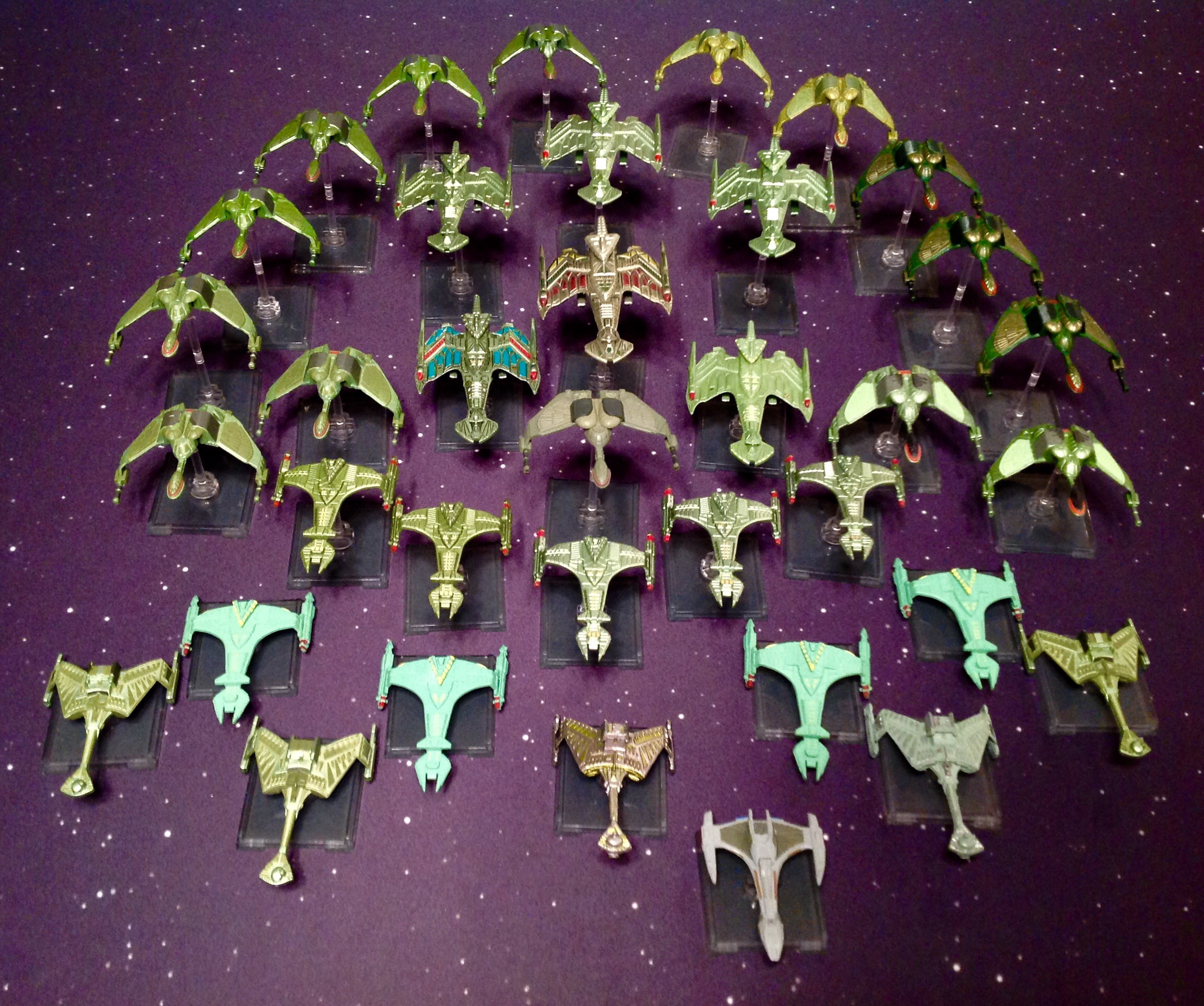
The often enemies, sometimes friend of the Federation was the Klingon Empire.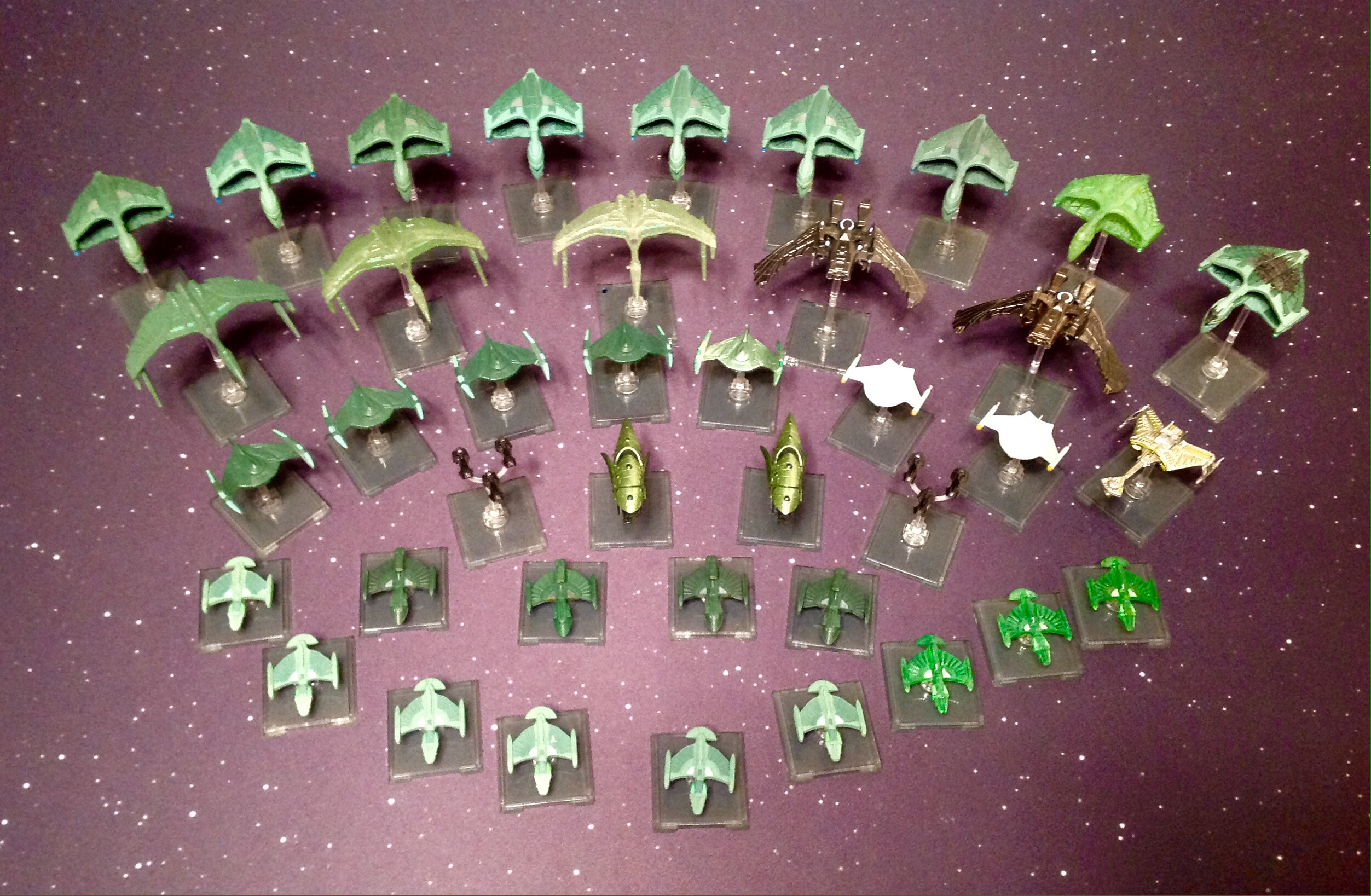
The Romulans never seemed to inspire the respect that the Klingons and Feds got. 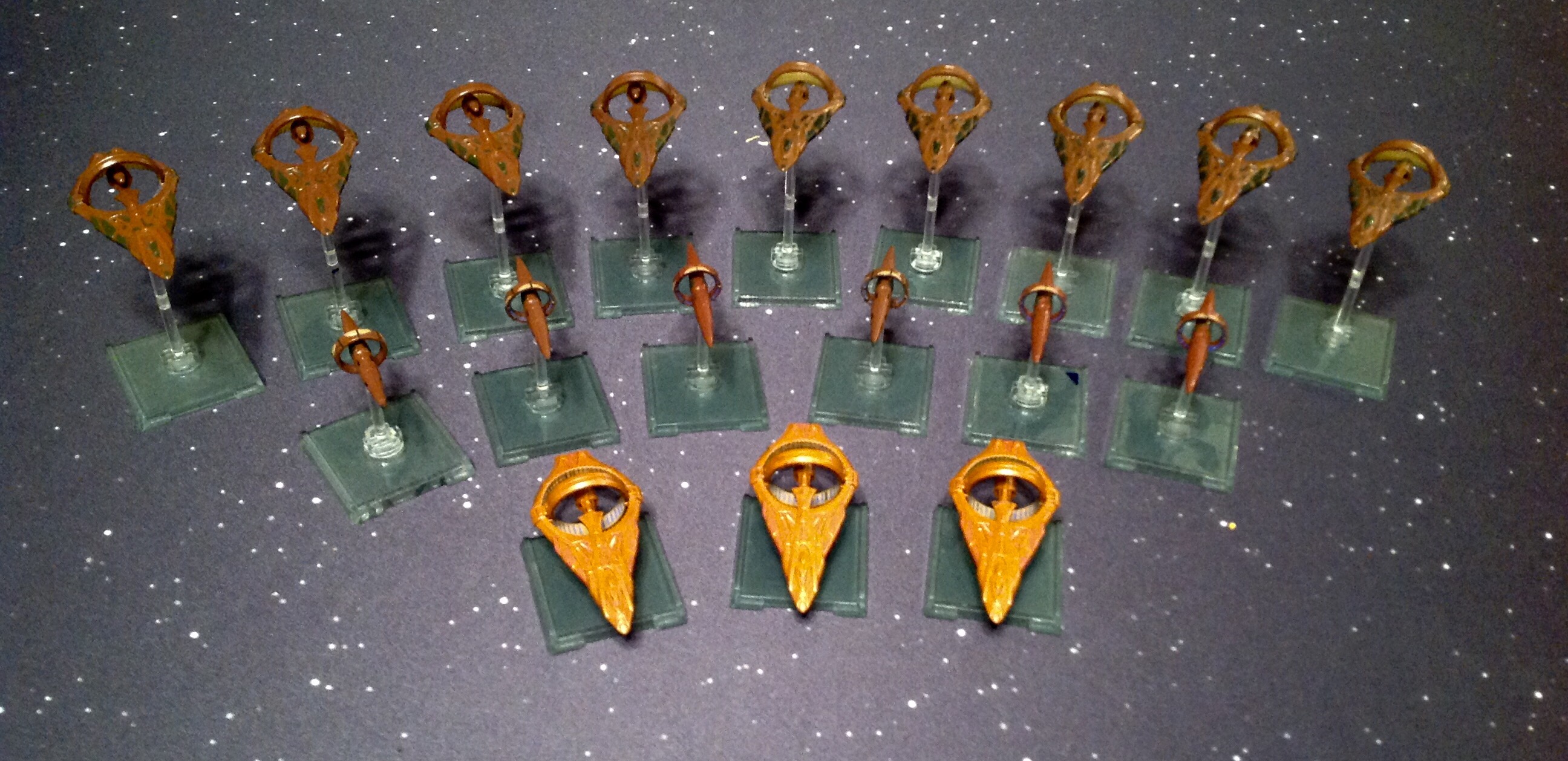
These are Vulcan ships. And While technically they are part of the Federation, they got their own fleet designation.
The Borg like symmetric ships. The “big cube” isn’t actually as dangerous as its size would indicate.
To combat the Borg, Species 8472.
In Deep Space 9, the Cardassians were the main bad guys. They were part of a fleet called the Dominion.
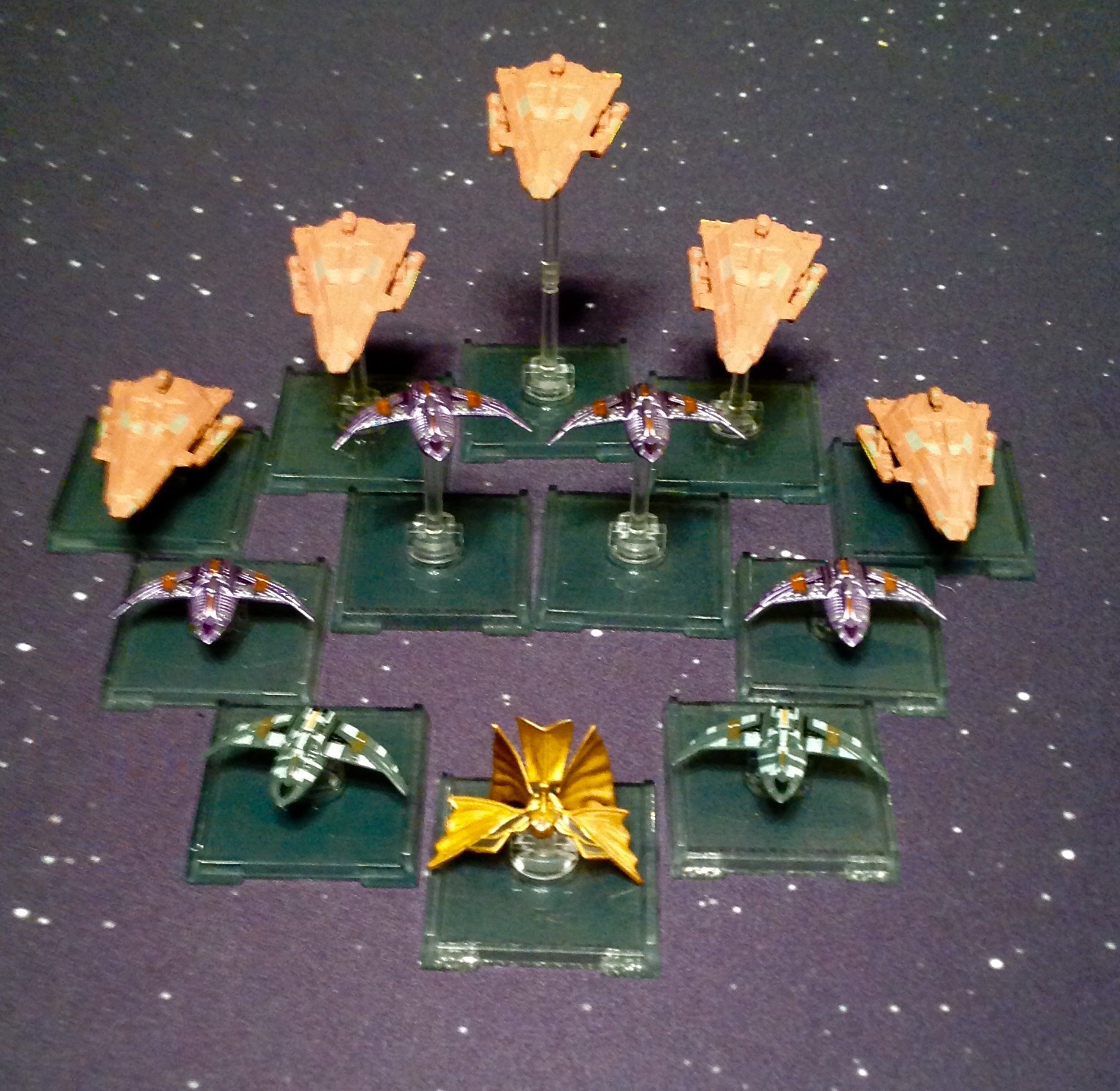
Also from Deep Space 9, the local fighters were called Bajoran. That “angel looking” ship is called a Sail Ship, and is considered one of the weakest ships in the game.
Another fleet from DS9, the Ferengi have some of the ugliest ships in the game. The colors are terrible, but have some of the best weapons.
The Kazon are a very obscure faction, and everyone agrees have the absolute ugliest ships.
The Xindi, are also an obscure faction from Star Trek: Enterprise series. The Xindi are considered the most powerful ships in the game.
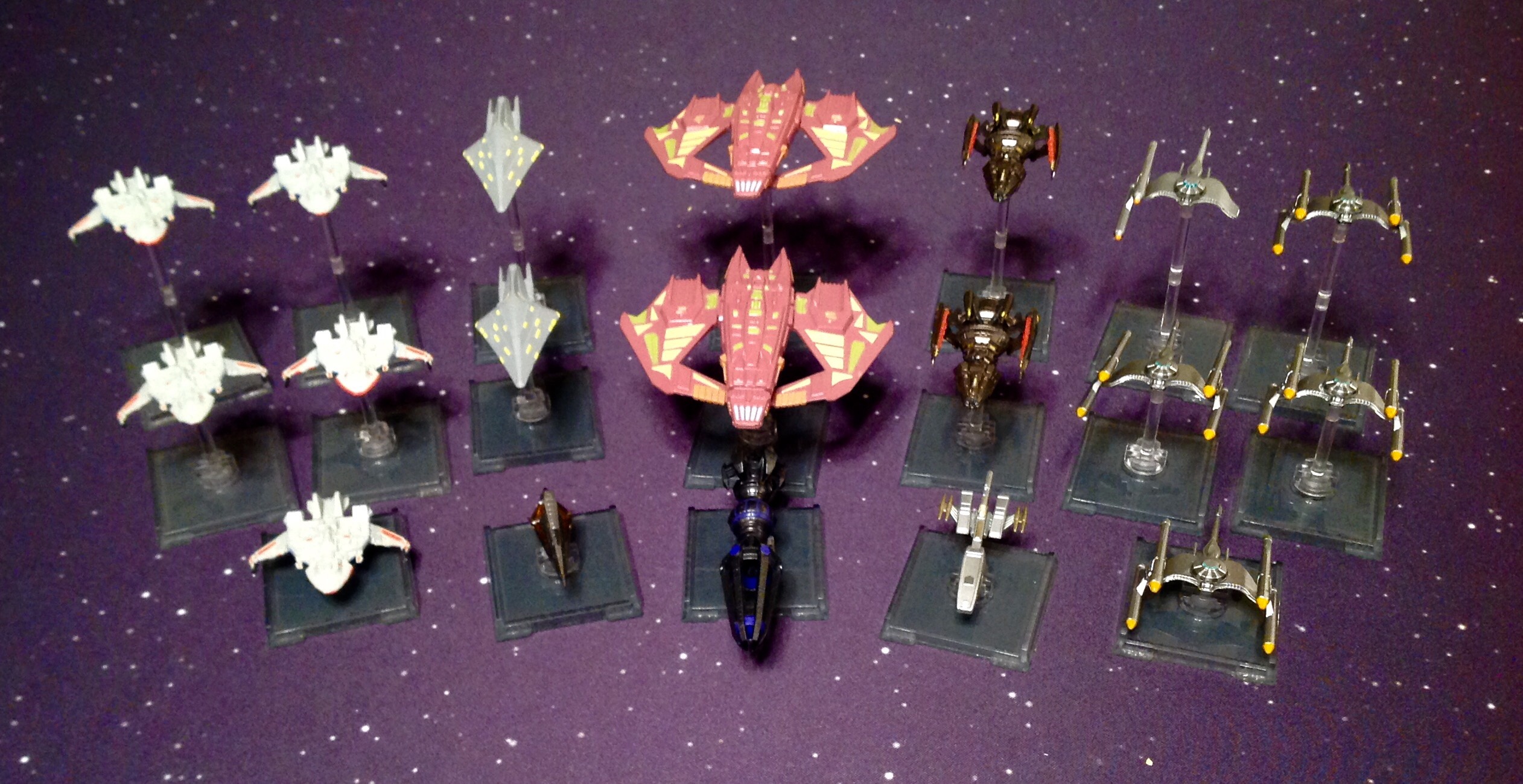
Finally, the “everything else” faction includes a hodge-podge of ships and races.
Rodney M Bliss is an author, columnist and IT Consultant. His blog updates every weekday. He lives in Pleasant Grove, UT with his lovely wife, thirteen children and grandchildren.
Follow him on
Twitter (@rodneymbliss)
Facebook (www.facebook.com/rbliss)
LinkedIn (www.LinkedIn.com/in/rbliss)
or email him at rbliss at msn dot com(c) 2017 Rodney M Bliss, all rights reserved
. . .but you don’t have a hammer
We’ve all heard the phrase, “When all you have is a hammer, every problem looks like a nail.” But, what about those problems that really are a nail? It’s okay to hit those, right?
Someone took my hammer this week. There’s a software tool I use daily. In fact, multiple times per day to service my client’s accounts. Yesterday I opened it and . . .it was a different tool. Well, it was the same tool, just with different, and less functionality.
I sat and stared at the screen. I closed and reopened the program. Maybe if I try it again, it will work?
Nope.
I stared some more.
Ever tried to pound in a nail with something other than a hammer? It’s an exercise in frustration. Maybe you’ve used a rock. It’s hard to not hit your fingers. A shoe? Not strong enough. In fact, hammers are pretty specialized tools. They do pretty much one thing. (Well, other than pulling nails, but let’s go with a big mallet for this metaphor.)
My hammer was missing. I tried to think of when the last time I’d seen it was. I’d used it on Friday and it worked just fine. Obviously, someone took my hammer over the weekend.
My nails were still lined up waiting for me to pound them, but I didn’t have a rock. I had to go look for the hammer. The problem was that the hammer was a gift. I hadn’t been required to go buy it. I wasn’t even sure where to buy those type of hammers.
Fortunately, I was able to ask a couple of people and eventually find the guy who hands out hammers. I explained my issue and he set me up with a hammer again.
Don’t use a hammer on every problem, but if your problem is a nail, a hammer comes in pretty handy.
Rodney M Bliss is an author, columnist and IT Consultant. His blog updates every weekday. He lives in Pleasant Grove, UT with his lovely wife, thirteen children and grandchildren.
Follow him on
Twitter (@rodneymbliss)
Facebook (www.facebook.com/rbliss)
LinkedIn (www.LinkedIn.com/in/rbliss)
or email him at rbliss at msn dot com(c) 2017 Rodney M Bliss, all rights reserved
